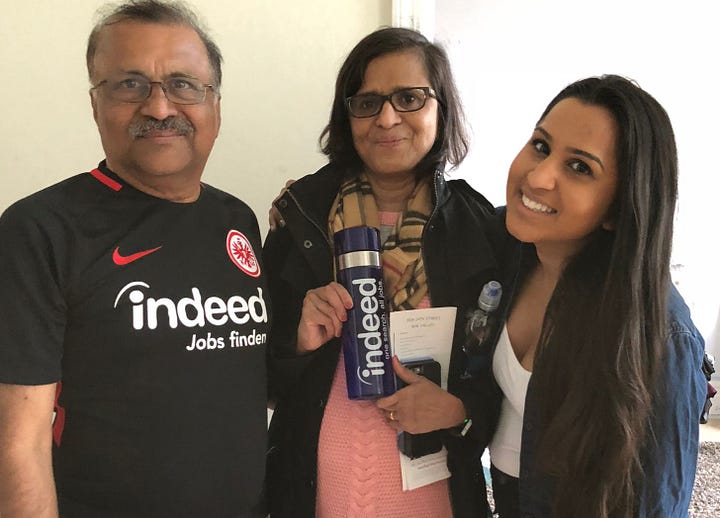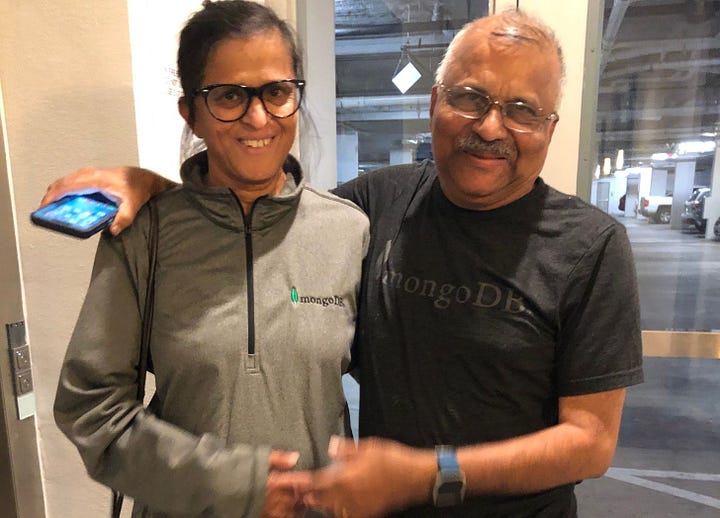What Do Your Parents Think?
My Guest Essay from Boundless by Paul Millerd
“I can’t retire, I have to save money for your wedding,” my mom blurted out in the middle of our video call.
I had been once again trying to convince her to retire and this was a surprising new excuse.
I was shocked by her admission as I’ve been single for years and have never even hinted at wanting my parents to pay for a wedding for me. It hadn’t occurred to me one way or another and I knew one of my aunties who had recently married off her daughter had planted this seed.
“Don’t be silly,” my older sister, Sammie, popped up behind me in my little FaceTime window. I sighed relieved, grateful to have a voice of reason join our conversation.
“I’ll give her the money!”
Or maybe not.
Not for the first time, I wondered if my family believed me when I told them I was doing OK.
What Do Your Parents Think?
When I started sharing my story about leaving software sales to take a two year sabbatical and pursue podcasting and writing, I was surprised that one question kept coming up.
“What do your parents think? They seem supportive.”
Sometimes I wonder if I need to wear a shirt that says: I’M A GROWN WOMAN
I know where the question stems from. The assumption is that because I’m Indian, my parents must have placed a high value on education and finding a good job when I was growing up.
In fairness, this is accurate.
Despite leaving the corporate world, my parents are still my biggest cheerleaders.
My parents support me, but they also worry about me. In their minds, they took big risks in life so that I wouldn’t have to. When I exited the workforce, I pushed us all out of our comfort zones.
To my parents credit, when I lost my job at the end of 2020, they supported my decision to leave the workforce and take a sabbatical. They even offered to let me live with them in their two bedroom apartment while I figured out exactly what my new path would be.
Truth be told, they were probably more thrilled about my ambiguous plans when they realized it meant I’d move in with them.
Indian parents love a multigenerational household.
Even with my decision to move back home, my parents struggled to hide that they were worried about me.
“Why don’t you look for some job?” my dad asked me, almost as soon as my boxes were unpacked.
It was a small comment, but I felt the tightness in my chest as his question washed over me. It stung because despite my outwardly confidence in my decision, I felt unsure and insecure. At the time, I didn’t know anyone who was on the pathless path. My parents were some of the only people who had had faith in me even when I couldn’t articulate a clear vision for my future.
A hint of doubt from my dad was like taking a hammer to the growing crack in my self confidence.
My older sister is my confidant and when she saw how teary eyed I was after this conversation, she encouraged me to be more empathetic with my father. She reminded me that when the recession in the 2000s hit our home state of Michigan, almost everyone we knew had at least one parent that lost their job. This included our dad.
“Not Working” Means Something Different to My Parents
I still remember my dad coming home early from the job he was very happy with at a factory working on car parts. The car industry and financial backbone of Detroit was collapsing and he was one of many people to lose their job during this time. For the next two years, he would struggle to find work and my mom, a nurse, became the sole breadwinner for our household.
Luckily, we were able to make ends meet, but my sister reminded me that the idea of “not working” to my dad meant worrying about providing for his family.
For their whole lives, my parents grew up working to overcome scarcity. My dad tells tales of climbing coconut trees when he was a boy in India so that he could sell the coconuts and get some money for his family.
Later in life, he and my mom moved to the United States, away from their friends and family in India, because they believed that here, they would be able to create more opportunities for their children.
When I was working full time in tech, I had great pay, benefits and was dressed head to toe in company swag. It was easy for my parents to see that they had in fact created a better life for me. My parents believed the predictability of a full time job meant I was safe.


My sister helped me approach a conversation with my parents that focused on why I believed I was secure enough to take this risk. I painted them a more clear picture of how long I could last living off my savings and investments.
Overtime, they saw I was financially OK and started to enjoy the evenings where we would drink chai and watch Jeopardy together. For them, having me home was worth everything and I appreciated that unexpected year with them as well.
Taking Risks From A Place of Security
For my parents, they can’t help but worry about me because in their eyes, I’m still their baby and they want to know I’m safe and secure. I don’t need their money, but they still want to catch me so I don’t fall and bruise my knees.
Even though they’ve always supported all my decisions, I’ve noticed that if I ask them their opinion ahead of time, they often recommend I take the more risk averse path. While this has never prevented me from making a big life change, I used to feel hurt if they didn’t support me. I didn’t realize they were coming from a place of fear, not disapproval.
Now though, I see the irony in my parents worrying about me making any big or small change in my life when they are the ones who left their home country in search of a better future for their children. They immigrated to Detroit of all places, didn’t know anyone, had no cell phones or internet and still they placed all their bets on a move completely outside their comfort zone because they had faith that they could create a better life for their children.
That risk paid off big for them. Maybe that’s why despite all their worries, they still encourage me to spread my wings and try new things.
Conclusion
My parents understand more than anyone that pushing yourself out of your comfort zone can change the whole trajectory of not only your life, but of generations to follow.
Yes, I had to explain to my parents what a podcast was and show them how to listen on their phones, but now they are our number one fans. My mom doesn’t miss an episode and will go on her friends’ phones to subscribe them to our podcast.
She does this all while telling my sister and I that we have the best podcast in the world and “I’m not saying that because I’m your mother.”
With my parents, I know that what they want is for me to be safe and secure. No matter how old I get, it’s impossible for them to fully let go.
I’ve come to terms with that.
My mom is always going to come to every phone call with an update on crime in my city. My dad is going to worry that while I’m turning away full time job offers, I’m hurting myself for any job offers in the future.
Still, the default path served our family well in the past, but now because of my parents, I have the opportunity to branch out and create a more meaningful life for myself on the pathless path.
By taking risks, I’m showing them that I have a belief in myself and in my vision.
They also now see that while they can’t solve my problems for me, they have given me the tools to take risks and be my own safety net.
Plus, I take it as a good sign that instead of worrying about my general well being, they’ve moved on to worry about who will pay for my wedding.
Which by the way, will be me.
While writing this essay, I tweeted my thoughts on the paradox of wanting to take risks while feeling the tension from my parents to stay safe. Many people related to this idea and a few told me to stop thinking about my parents and just take more risks.
My mom’s response?
This essay was originally posted on March 18th, 2023 as a guest post for Boundless by Paul Millerd. Thank you so much to Paul for letting me share my essay with his audience!




Great read! Congrats on the feature as well. :)
Thoroughly enjoyed your story here and your balanced perspective! Great read :)